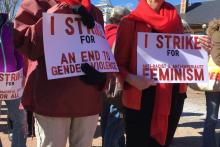
Kirsten Gibson
On March 8, 2017, women and their allies from the Greater Lafayette area will strike in solidarity with women across the world to bring attention to the inequalities, injustices, and violations of human rights that women endure every day.
The Younger Women’s Task Force of Greater Lafayette convened a planning committee of diverse women and women-aligned people from the community to coordinate local efforts across West Lafayette and Lafayette. Workers from all walks of life, including local unions, are expected to participate.
For those that can, they ask women to take a day off from paid and unpaid labor and join them at the Hanna Community Center at 1201 18th St., from 8 a.m. to 6 p.m. There will be workshops addressing intersectional feminism, opportunities to create art, and viewings of documentaries such as the award-winning “13th” directed by Ava DuVernay. Local strikers are welcomed to drop in.
For those who cannot strike all day, they ask women and their allies to participate by walking out at 11 a.m. and joining them at rallies at one of three locations across the city. Groups will gather at the Engineering Fountain on Purdue’s campus, Riehle Plaza in downtown Lafayette, and at the Hanna Community Center to read the unifying principles curated by the United States Women’s Strike organizers, borrowed from Polish and Argentinian organizers, and allow local participants to express why they’re striking.
Finally, for those who can’t participate in person, they ask that women and their allies wear red in solidarity, boycott known misogynist businesses, or strike from their “normal” gender roles in the home. If local women would like to coordinate their own rallies or strikes, resources and more information can be found at GreaterLafayetteWomensStrike.com.
The strike’s message is simple: Women across the world contribute equal effort and labor daily but experience greater inequality. On average, women are paid 80 percent of what men are paid. For women of color, it’s even lower. Black women receive 63 percent, indigenous women 58 percent, and Latina women 54 percent according to the American Association for University Women.
The strike brings International Women’s Day back to its roots, focusing on intersectional feminism. Nationwide strikers are encouraged to adopt an explicit focus on women of color, trans women, working class women, disabled women, and those most vulnerable to sexual harassment, discrimination, and job insecurity.
